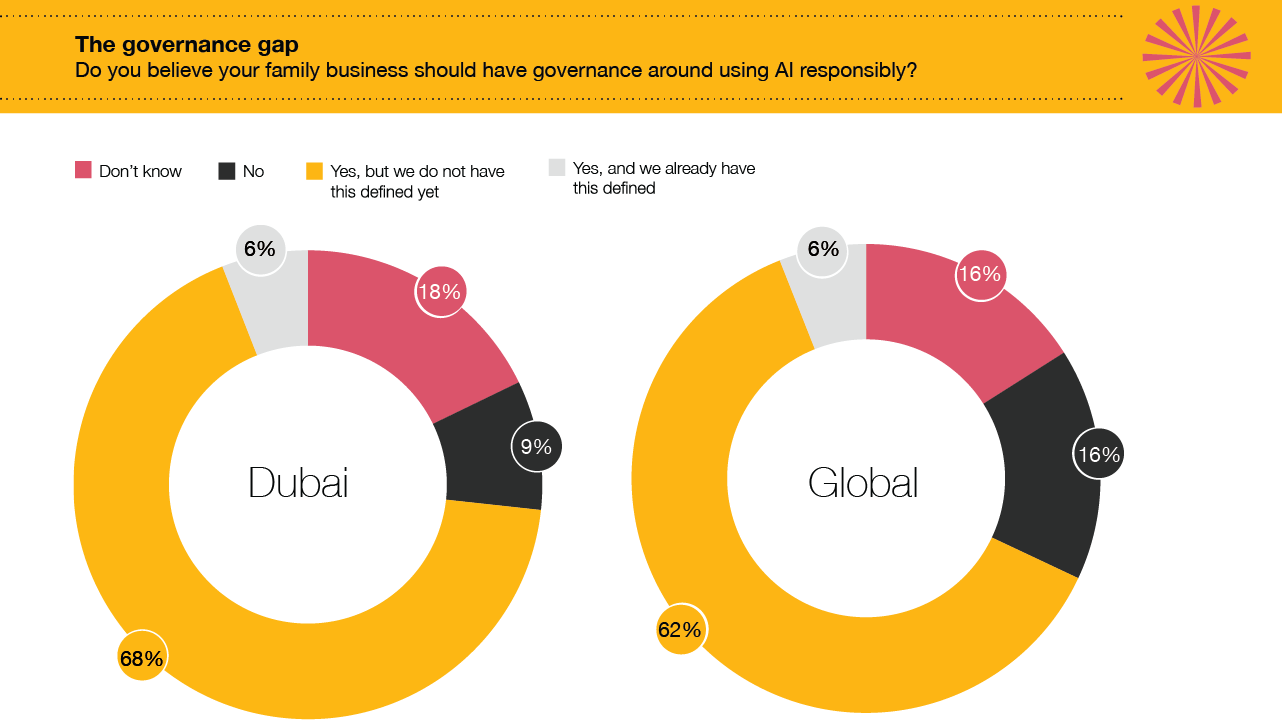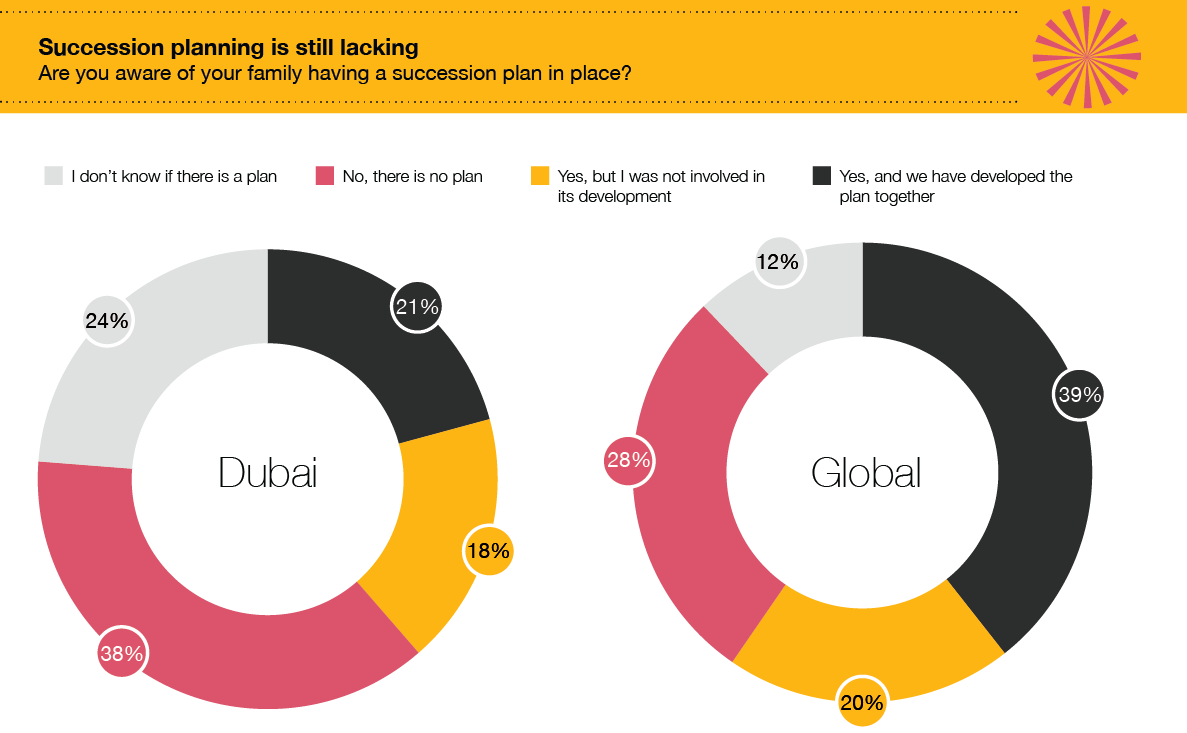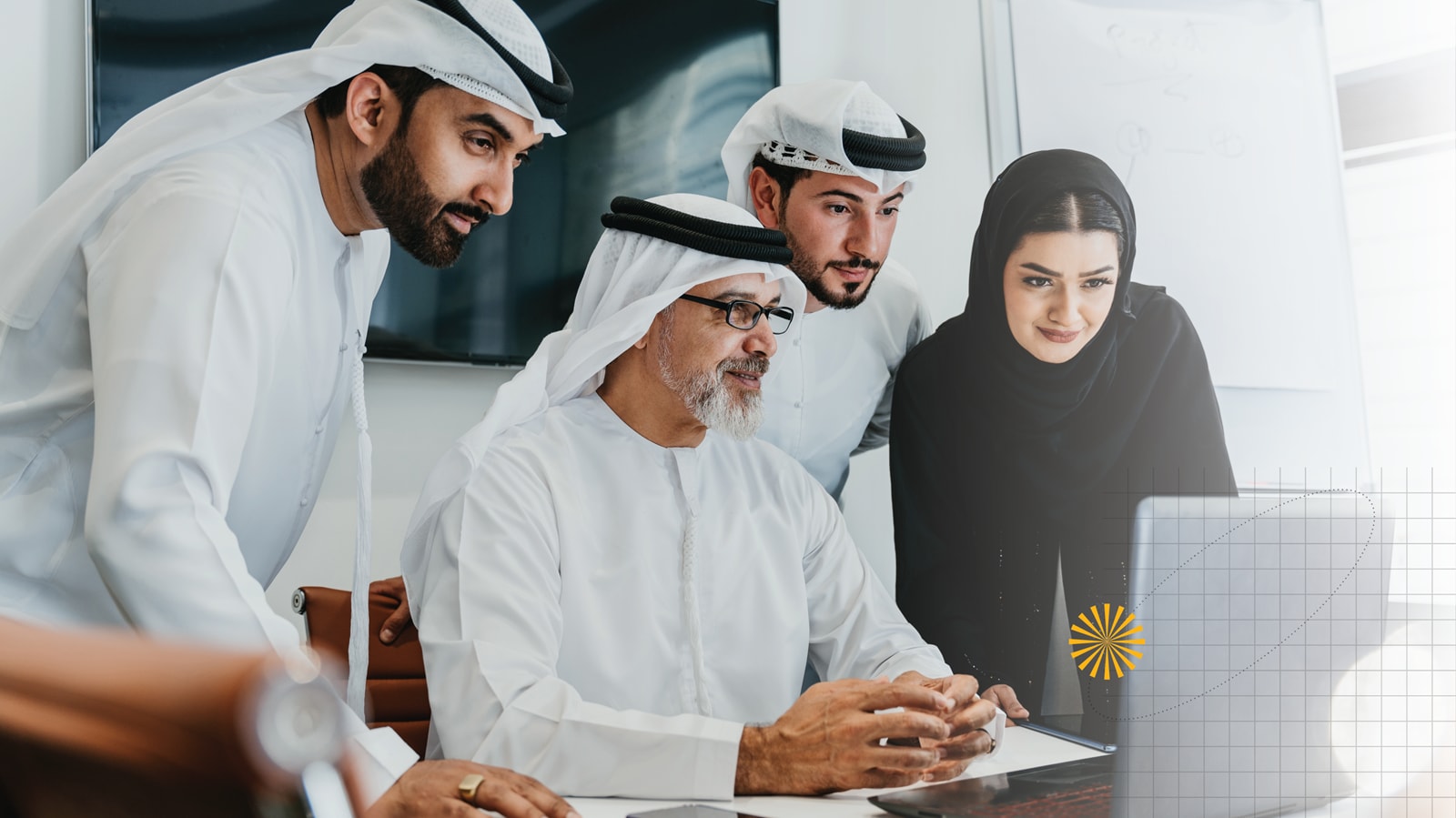Over the coming decade, many family businesses will transition to a new generation of leaders, resulting in a massive transfer of wealth and responsibility. This group, we call NextGen – the generation of a business owning family who are aged between 18 and early 40s, who are aiming to become responsible owners, influential board members, or visionary leaders. The succession process is challenging, requiring strong intergenerational communication and robust governance, but this transition will be the most critical in history, because it coincides with the transformational influence of GenAI.
Family businesses around the world are facing up to this challenging evolution, as their competitors around the world race to adopt rapidly evolving technologies. For those that get the transition right, GenAI will help to shape their future success of the business and of economies in the region. But the risks for family businesses are immense.
Our 2023 Family Business Survey examined the role that trust plays in the success of family businesses in our region as they work to maintain their outstanding growth. Protecting this trust premium in the era of GenAI, while maintaining a unified direction among all family stakeholders, represents the most complex challenge family businesses have ever faced.
We believe that NextGens hold the key to successful transition. As future business owners, NextGens have a unique responsibility towards their business, its employees, their families, society, and the environment, and this includes an interest in the business’s ability to responsibly implement emerging technologies. This survey shows that NextGen are more optimistic about GenAI than the incumbent generation and understand the need to urgently harness the potential of the technology across the entire enterprise.
Accessing growth
Business leaders across the region remain confident that strong growth will continue – 66% of all CEOs in the Middle East are confident their company will see revenue growth in 2024, compared with just 47% of their global peers. Additionally, 73% expect to see economic growth in their own country, compared with 44% globally – although the risks related to geopolitical conflict are a constant concern. Growth remains top of the agenda for family businesses, with nearly three quarters of family businesses in the region expecting to grow this year, and 65% of NextGen based in Dubai name growth as a top three priority for the next two years.
This growth, however, is highly dependent on the successful implementation of emerging technologies. 73% of CEOs in the Middle East say that GenAI will change the way their business creates, delivers, and captures value over the next three years and almost half (48%) believe that if their business does not evolve, it will not be economically viable in its current form within 10 years.

A cautious approach to innovation
Most family businesses across the world are yet to take concrete steps to implement GenAI, placing them at a disadvantage compared to public company competitors. Our 27th Annual CEO Survey: Middle East findings have indicated that among all companies in the GCC, 36% already use GenAI (common uses include, automated customer service bots, fraud management and Anti-Money Laundering (AML) compliance systems, adding a predictive element to inventory management and procurement, and supporting recruitment and talent sourcing) – but fewer than one in 10 family businesses in Dubai have implemented the technology.
Historically, family businesses have consistently adopted a more cautious approach to emerging technology. Restricted access to capital has meant that many prefer to rely on proven technology rather than risk a large investment on an uncertain outcome. But the UAE, with its attractive regulatory landscape that has encouraged an influx of family offices in recent years, is at the forefront of the changing investment landscape for family businesses. Strong revenue growth, active family offices looking for investment opportunities, and a willingness to partner with private equity, have significantly improved the access to capital for family businesses who are willing to take the leap on GenAI.
Family businesses have very good reasons for showing caution on adopting AI – they are protective of their businesses and that means avoiding big risks. But AI is moving so quickly, and the potential for competitive advantage is so considerable, that immediate action is required and an informed leap into the unknown.
Protecting the trust premium
The trust of customers and employees, and between family members, is essential to the success of family businesses. Family businesses are more trusted than any other business and those in the Middle East enjoy a particularly strong trust premium. According to our Family Business Survey, two thirds believe they are fully trusted by their customers compared with just over half of the global sample.
Trust in business and trust in technology are inextricably linked; a data breach or poor customer service can damage the bond of trust that family businesses have worked so hard to earn. This means that family businesses cannot afford to experiment with GenAI or take a misstep with implementation.
68% of NextGen in Dubai (vs 50% globally) believe that family businesses have an opportunity to take a leading role in the responsible adoption of AI.
Only conscious, responsible adoption will allow family businesses to gain from the technology while maintaining their vital trust premium. This requires robust and well-defined governance, reflecting the values and purpose of the business, around use of the technology – almost three-quarters of Dubai-based NextGen say this is essential but only 6% of family businesses have already taken this step.

Succession and the vital role of NextGen
NextGen family members are a valuable resource for family businesses as they race to compete in a rapidly changing world. They have a natural affinity with emerging technology, and this is especially apparent in Dubai. A significant 88% have indicated they are personally interested in GenAI and 68% say they are knowledgeable about the technology, compared to 53% globally – yet only 9% of NextGen are currently engaged in GenAI in the business.

The willingness of NextGen to explore new ideas and technology while contending with the more traditional instincts of the current leadership is a long-standing trend in family businesses. The reality is that each generation has its own capabilities and is working towards the same goal: to secure the business and its legacy.
41% of NextGen in Dubai believe that being a champion for AI will help them move into a leadership position and are generally positive about their career opportunities. However, formal succession planning among family businesses in the Middle East is not commonplace. Half of Dubai NextGen say that the ability or willingness of the current generation to retire is a difficult aspect of succession. Only 39% of NextGen in Dubai were sure that their family business had a succession plan in place, and in many cases, they were not involved in its development.

Next steps
The views of the next generation of family business leaders collected for this survey write a compelling narrative for the future of family businesses in Dubai and the wider UAE and particularly for the role of GenAI. Although adoption may currently be limited, NextGen demonstrates a forward-thinking approach and is keen to embrace the technology’s transformative capabilities.
NextGen has an enthusiasm for emerging technology and a unique perspective that can help shape the future of family businesses in our region in an era defined by digital disruption. The energy and insights of these younger successors are critical for family businesses as they create new pathways for sustained growth – but the risk is that a lack of focus on governance and succession is getting in the way.
NextGen will be vital to family businesses maintaining and building on their impressive growth story in our region, if the conditions are right for them to flourish.
About the survey
PwC’s Global NextGen Survey 2024 is an international market survey among next-generation members of family businesses. The goal of the survey is to get an understanding of what NextGen are thinking on the key issues of the day, what role they are playing and what roles they think they should play. The survey was conducted online with 917 interviews in 63 territories; the global analysis was based on survey findings between 13 November 2023 and 23 January 2024.
The Dubai cut of the survey is a collaboration between PwC Middle East and the Dubai Centre for Family Businesses - Dubai Chambers.









